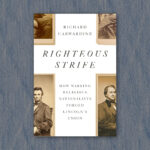Why have so few Reformed Christians been pacifists? A plain reading of Jesus’s teachings would seem to commend a pacifist interpretation, at least at the individual Christian’s personal level. As he famously instructs us, “Do not resist the one who is evil. But if anyone slaps you on the right cheek, turn to him the other also” (Matt. 5:39). Yet Christian pacifism has gained much more traction among Anabaptists, and among liberal Catholics and Protestants, than among Reformed believers.
If the Word of God is our final authority for faith and practice, we should be willing to ask why Reformed Protestants have tended not to be pacifists. While I can only offer tentative answers to this enormous topic, I suspect there are two major explanations: one admirable, and the other problematic.
Approach to Scripture
The first reason is that Reformed Christians have traditionally been hesitant to prioritize any particular parts of Scripture, and have tended to read (however imperfectly) the Bible as a whole. Pacifist Christians are sometimes, by their own confession, “red-letter Christians” who give Jesus’s teachings on ethics top biblical billing. At times they imply, perhaps unwittingly, that other parts of Scripture—such as the accounts of the Israelites’ wars against the Canaanites—do not carry the same authority as the teachings of Jesus.
While Reformed Christians would never advise neglecting Jesus’s teachings, they balk at suggestions that some sections of Scripture take precedence over others, or that certain passages contradict. Therefore, as difficult as it may be to explain, Reformed Christians begin with the assumption that Jesus’s teachings on non-retaliation somehow mesh with the Israelites putting men, women, and children to the sword. Since we believe in the perfection and inspiration of Scripture, and its sufficiency as a guide to the ways of God, this correct assumption that should indeed undergird our interpretation.
Reformed Christians have similarly tended to see certain continuity between the Old and New Testaments. Although Israel and the church are distinct entities, they contend, there are similarities between the way that God related to Israel and the way he relates to the church. Thus, if God at times commanded Israel to take on military assignments and conquer territory, it isn’t a stretch to think he might ask Christians to do the same things through the agency of the governments under which they live.
Checkered Past
Herein lies the more problematic factor in the relative absence of a Reformed pacifist tradition: Reformed Christians have often been too comfortable with state-sanctioned violence. Since the Reformation, many Protestants have seen an important role for nations, kings, and militaries in advancing the ends of the kingdom. If one believes in providence, then of course the acts of nations do somehow fulfill God’s plans for humanity. But Reformed Christians could borrow a dash of pessimism from Christians such as Anabaptists (Mennonites and others), and theologians such as Stanley Hauerwas, who are inherently skeptical about the agenda of any nation-state and its military pursuits.
To cite just one era’s attachment to the state, consider New Englanders after the Glorious Revolution (1688–1689). The removal of the Roman Catholic King James II from the English throne inaugurated decades of imperial war between Europe’s Roman Catholic and Protestant powers. Colonial New Englanders were often directly affected by these conflicts, especially in vicious wars with their Roman Catholic neighbors to the north in Canada.
Anglo-Americans in the first six decades of the 18th century attached enormous religious importance to the success of the British military, and the protection of the British monarchy, all in the name of the Protestant cause. To them, this meant the continued reign of the House of Hanover, the Protestant King Georges (including, initially, King George III). Benjamin Colman, the leading pastor in Boston at the time of the Great Awakening, once stated that New Englanders’ “adherence to the Protestant Succession in the House of Hanover is our fidelity to CHRIST and his holy Religion.” Supporting the king “is” our fidelity to Christ? If that sort of civil-religious statement doesn’t make you wince, you’re not thinking correctly about our priorities as Christians.
Of course, many Calvinists have deplored the effects of war and imperial aggression, but these figures were often marginal to state power. Baptists who were persecuted in late colonial America, or Native American evangelical converts during the Great Awakening, commonly took a dim view of the Patriot cause in the American Revolution. They had suffered bad treatment from some of the same men who now called on them to take up arms against the British. Leading Baptist pastors Isaac Backus and James Manning didn’t react with martial zeal when the first battles of the American Revolution began. Instead, they regretted that the war seemed to snuff out an ongoing revival that had recently begun in New England. “Oh horrid war!” they lamented. “How contrary to the spirit of Jesus!”
Celebrated Baptist Calvinist pastor Charles Spurgeon registered similar concerns about Britain’s imperial exploits of the 19th century. But pacifist-sounding quotes notwithstanding, Spurgeon does not seem to have embraced full-blown anti-imperialism. Reacting to an 1857 rebellion in India, Spurgeon made comments that, when taken out of context, could peg him as a pacifist. “Long have I held that war is an enormous crime,” he said, “long have I regarded all battles as only murder on a large scale.” Yet he cited Romans 13, noting that the ruling authorities did not bear the sword in vain. “This time,” he said, “I, as a peaceful man, a follower of the peaceful Savior, do propound war.” He saw the rebels as murderous criminals who must get their just due from the state.
Humble Skepticism and Regretful Support
I am a Reformed evangelical Christian, and I am not a pacifist. I do not see a consistent pacifist requirement in Scripture, especially for rulers and governments. But Reformed Christians could use more skepticism about the wisdom and value of war, and about the aims of the nation in which they live.
We should pray for leaders’ wisdom, and regretfully support wars when they meet standards of just conflicts (they should be limited, defensive, and so on). Instead, Reformed Christians, and American evangelicals generally, have sometimes seemed like zealous warmongers, believing their nation was seamlessly carrying forward the purposes of the kingdom of God.
Free eBook by Tim Keller: ‘The Freedom of Self-Forgetfulness’
 Imagine a life where you don’t feel inadequate, easily offended, desperate to prove yourself, or endlessly preoccupied with how you look to others. Imagine relishing, not resenting, the success of others. Living this way isn’t far-fetched. It’s actually guaranteed to believers, as they learn to receive God’s approval, rather than striving to earn it.
Imagine a life where you don’t feel inadequate, easily offended, desperate to prove yourself, or endlessly preoccupied with how you look to others. Imagine relishing, not resenting, the success of others. Living this way isn’t far-fetched. It’s actually guaranteed to believers, as they learn to receive God’s approval, rather than striving to earn it.
In Tim Keller’s short ebook, The Freedom of Self-Forgetfulness: The Path To True Christian Joy, he explains how to overcome the toxic tendencies of our age一not by diluting biblical truth or denying our differences一but by rooting our identity in Christ.
TGC is offering this Keller resource for free, so you can discover the “blessed rest” that only self-forgetfulness brings.


































